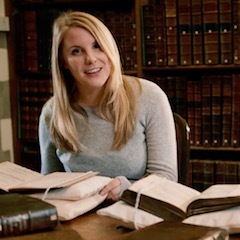

Emily Thomas – Travel Writing as Thought Experiments: Science, Francis Bacon, and Margaret Cavendish’s Blazing World
5 April 2019, 2:00 pm - 3:30 pm EDT
ABSTRACT
Travel has a long and intimate history with philosophy. Travel also has a long and intimate relationship with fiction. Sometimes travel fiction acts as ‘thought experiments’, experiments that we can run through in our heads. This talk explores a 1666 fiction travelogue, Margaret Cavendish’s Blazing World. In the novel, a virtuous young lady is kidnapped and travels by boat through the North Pole into a new world. I argue this is no mere piece of science fiction. Instead, this travelogue acts as a distinctly philosophical thought experiment, exploring the philosophy of science, utopias, and what it means to be real.
SPEAKER PROFILE
 Emily Thomas is an Assistant Professor in Philosophy at Durham University. She has written a lot on space and time in early modern and early twentieth century philosophy. She also has research interest in other metaphysical issues, including substance, change, motion, idealism, process, personal identity, and philosophy of religion. Thomas likes digging out the work of rich but under-studied figures, including women philosophers who have traditionally been neglected in the history of philosophy.
Emily Thomas is an Assistant Professor in Philosophy at Durham University. She has written a lot on space and time in early modern and early twentieth century philosophy. She also has research interest in other metaphysical issues, including substance, change, motion, idealism, process, personal identity, and philosophy of religion. Thomas likes digging out the work of rich but under-studied figures, including women philosophers who have traditionally been neglected in the history of philosophy.
In 2018 she published two books: Absolute Time: Rifts in Early Modern British Metaphysics (Oxford University Press) and Early Modern Women on Metaphysics (Cambridge University Press). Her work has been supported by a Veni research grant from the Netherlands Research Council and a Rising Star grant from the British Academy.
Recently, she’s been thinking about philosophical issues in travel. What is travel? What are maps? How has philosophy affected travel, and how has travel affected philosophy? She’s writing a book on this, for which she is represented by United Agents.
Read more about Emily Thomas.
Image credit: Keith Williams – Solar Storm over Twin Lakes (reversed) license
